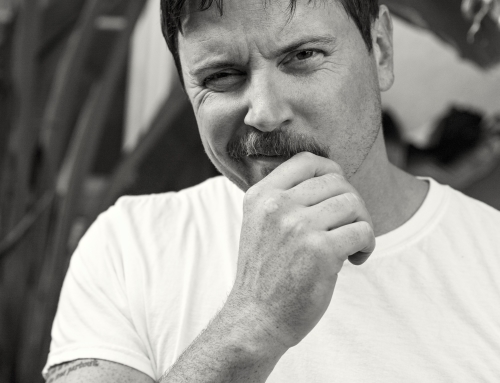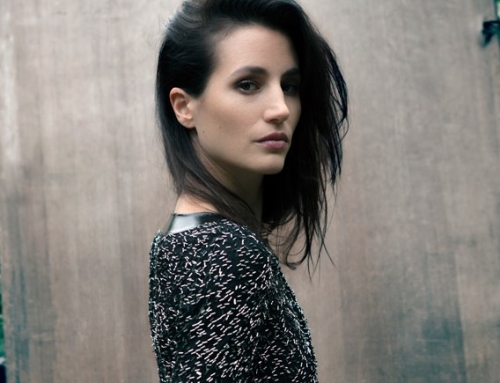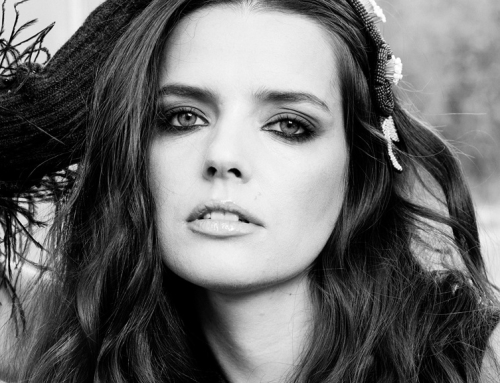In Hollywood, the showdown between good and evil, rarely leaves room for grey areas where questions of motivation are permitted to fester. The hero is on the side of right, and the villain is on the opposite side. Tried, tested and true though this formula may be, for director Rian Johnson, it leaves no room for fun. And fun, is what Johnson’s latest film, Looper, is all about.
Spectacular action, evocative drama, and witty repartee imbue Looper’s narrative with high entertainment value, while its plot challenges black and white morality, ultimately leaving it up to the audience to decide which character is the true hero of the story. In Looper‘s universe, right and wrong is a matter of sympathy for the devil.
“Part of the fun of specifically this movie, I think for the audience….or I hope for the audience….is trying to figure out who the hero and the villain is. We purposefully play with who you’re rooting for,” explains the director. “Who you think is the hero could turn at any moment, and that’s part of the fun of it.”
Possible heroes come in the form of Joe, a hired assassin responsible for taking out the future’s garbage. As a looper, Joe — played by Joseph Gordon-Levitt — waits for his not-so-law abiding employers from the future to send back their targets for him to terminate.
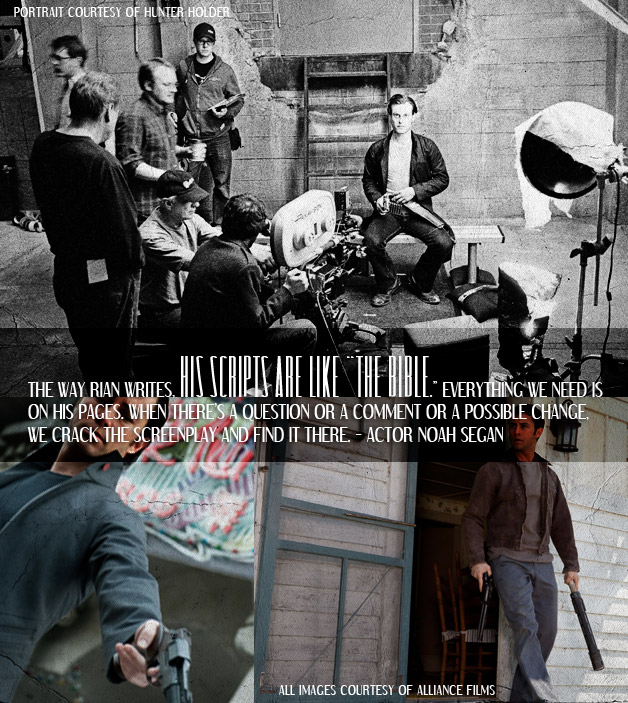
The blur between right and wrong begins when Joe’s future self is sent back as his next kill, and rumblings from the future become earthquakes in the present. Future Joe (Bruce Willis), further throws off the scale of good and evil when he escapes in order to right what he see’s as future wrongs, consequently landing his present self on the underworld’s most wanted list. And then there is the Rainmaker, the enigmatic super evil with a Voldemort-esque omnipresence in both the future and present worlds, and a storyline that could give a damn about genre archetypes.
As a filmmaker, Johnson has built his reputation on thinking outside the box. Since stepping onto the scene back in 2005 with his noir coming of age story, Brick, the director has demonstrated his versatility and originality as both a writer and director. With Looper, Johnson reaches beyond the sci-fi action genre, and does what he does best: tell stories about people.
Actor Noah Segan, who plays the bumbling baddie Kid Blue in the film, and who also co-starred in Brick, credits his director with making a film that doesn’t rely on over the top spectacles of action or gimmicky sci-fi effects to sell its story. “Action movies and high-concept science-fiction aren’t usually known for tackling the big ideas of sacrifice and selflessness, beyond following the hero into an adventure the audience knows will turn out just peachy,” says Segan. “With Looper, Rian uses the conception of time-travel, righting wrongs and addressing regret, to show how a character can change, grow, evolve.”It may just have been this rare attention to character arcs that landed Johnson’s film’s all-star cast, which also includes Jeff Daniels as Abe, the crime boss chasing down Joe (young and old), and Emily Blunt in the role of Sara. A catalyst for action, Sara gets Joe out of the city, but not harm’s way.
Opening this year’s Toronto International Film Festival on Thurday, Looper hits theatres across North America September 28th. To tide fans over till then, we talk to director Rian Johnson about the inspiration behind Looper‘s sci-fi premise, the challenge of creating a villian, and his love of working with friends in the business.
Are you excited about TIFF? You’ve been previously with the Brother’s Bloom, but to be the opening night film, that’s a pretty huge deal.
So excited! Been done with this movie for 4 months now. It’s also fun to just talk to my mom’s friends, and realize that they also know that the movie is out there, and maybe it will be a bit more of a broader audience – it’s a really cool thing.
Have you gotten use to being the man behind one of this year’s most anticipated Blockbusters? Little nervous perhaps?
I wasn’t scared until you said that sentence, now I’m terrified!
Don’t be! How did you find the whole experience of working on a big budget picture with Sony? Pretty different from the production of your other pictures I imagine.
It was interesting, cause actually Sony came in after the fact, we actually made the movie independently so budget-wise and skill-wise it wasn’t that much bigger than [The Brothers] Bloom. Independent films are very similar, we tend to work with the same kind of tight group of people. My cinematographer and I have been friends since college, and my cousin is my composer, and he and I have been making movies together since we were 10-years-old. And Joe and I have known each other for ten years since we made my first film Brick together. So there is kind of like this family of friends who we get together and make a movie. So it didn’t feel like some big huge different type of thing, it just felt like we were getting together to make another movie.
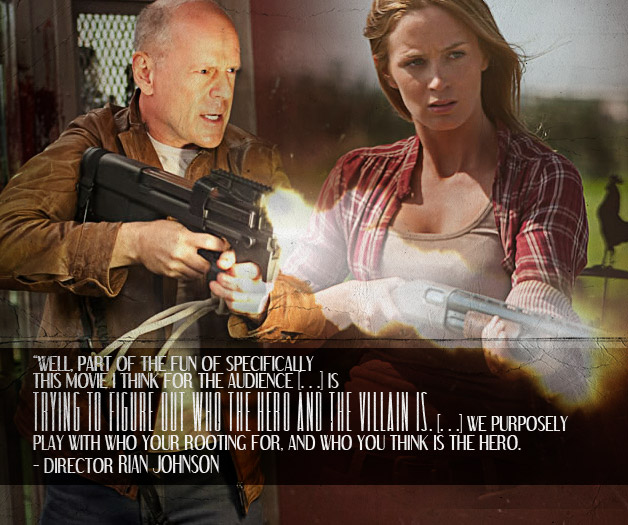
Coming from an indie-film background, where films are really narrative driven, do you think you brought a different sort of creative vision to the action blockbuster genre?
I hope…I mean the movie definitely has really fun action element, and it was fun for me to dive into those [scenes]. But for me, at the heart of it — any movie, including a good action movie — it is about the characters and about the story. And that’s really, as fun as all the action stuff is.
In the end, it’s a character driven film then?
It’s really the scenes between the characters, and the drama in the movie that hopefully draw the audience all the way through it. And that’s the same as our previous two movies. I love action movies so much I wouldn’t say we are bringing anything new to them…but will just say we were trying to emulate the best of them by focusing on the characters, and by focusing on the things that matter.
Take us back to the beginning, what inspired the idea of the Looper?
I wrote the original idea for it about ten years ago as a short film, but I never ended up shooting, so I have had the Looper idea for a long time. I remember telling Joe about it at Sundance when we were there for Brick, so it had just been sitting around for a long while. And the initial idea I can’t really remember where it actually came from…but I was reading a lot of Philip K. Dick novels, so I am sure that having my head in the sci-fi world has something to do with it.
What about creating your villain, it’s a difficult thing to create the perfect villain.
You know we have a terrific actor, Noah Segan, who plays the character called Kid Blue, and he is an example of the villains that I really love, where he kind of plays the antagonist roll in the movie, he is kind of the foil for Joe. But at the same time, you have a lot of sympathy for him, and you see where he is coming from. I always think villains are more interesting when they are sympathetic and truly sympathetic…when you can actually [know] why they are doing what they’re doing.
Well, whenever they’re doing what they’re doing — right or wrong — your characters look good doing it. You get a great sense of classic gangster films in your movie. When writing the character of Joe, did you take inspiration from any old noir films or pulp fiction novels?
It’s funny not specifically…I mean that is probably in there because I love all that material. I have absorbed quite a lot of it, so I am sure there is plenty in there, but when I was writing it, its interesting the movies I was watching and looking to for inspiration weren’t really crime movies, and they weren’t even really sci-fi movies, the film Witness was one I kept coming back to. Actually largely because of the second half of it, and how it’s structured with the farm and the city.
Any other inspiration?
I would watch a lot of French New Wave movies to get the feel of the loopers in the first part of it, and the kind of loose government, devil-may-care lifestyle I guess. So yeah: always look outside of the genre that you are in for stuff to steal from.


Rian’s the smartest guy I know. He has impeccable taste. A lot of folks compare being a boss on a movie (a director, producer, filmmaker) to being a politician. Rian doesn’t do politics, he does diplomacy. There’s a reason one of the most memorable lines from The Brothers Bloom is that when a score and a con are perfect, “Everyone gets what they want.” That’s sort of how Rian looks at the world. He’s a lover, he cares, and he knows that the movie only works when everyone manages to play their instrument perfectly. But all that personal attitude really takes a backseat to the fact that the dude can write.

The simple answer is, I played Kid Blue as if he were trying to keep his job at any cost, something a lot of us can relate to! No matter how nice or well-adjusted we may be, we’re at our most dangerous when backed into a corner, when we’re vulnerable. When something jeopardizes our career or family or purpose, we can easily become desperate and vicious. I think what The Kid goes through represents that, even if it’s obviously all against our hero, Joe. The Kid spends most of his time trying to prove himself and “make good”, for his gig and for his father-figure and boss, Abe (Jeff Daniels). As he continues to fail, The Kid becomes more and more desperate, more dangerous. He’s hobbled by injuries, by being banished, and that vulnerability makes him both pathetic and hopefully threatening. He wants to succeed, and that’s something we can all relate to. It also helps that I cry a lot.

Rian and I have a deep affinity for “bumbling” characters. In Brick, which has a lot of tonal and plot points inspired by The Maltese Falcon, I play a character with similarities to Peter Lorre’s character, and we actually directly paid homage to it with the back-and-forth slapping that Bogart does to him when Brendan slaps Dode behind the dumpster. I think that tone carried over to Kid Blue in Looper, the concept that a questionable antagonist could also be a little silly sometimes, that he doesn’t see a line between what’s “cool” or “collected” and how he accomplishes his purpose. The humor is actually that the guy thinks he’s got his act together as much as the hero, but can’t quite cut it.

There is simply no substitute for working with people who are your best friends. Whether it’s Rian, Joseph, or even our producer Ram, having a foundation and a shorthand, enjoying the same stuff and having the same sensibilities for storytelling and humor is the most valuable tool for collaborating. Those guys made a huge effort to convince everyone I was the right guy for the gig even before we stepped on set. That kind of faith left no room for anything but doing the right job. We had to do a great job, we had to trust one-another and frankly, we were all doing what we do — make movies— so it just made sense.

The way Rian writes, his scripts are like “The Bible”. Everything we need is on his pages. When there’s a question or a comment or a possible change, we crack the screenplay and find it there. We’re all also very neurotic over-preparers. Rian and his cinematographer, Steve, are meticulous with their shots. Joe and I will rehearse up until the minute of actually rolling. We end up on set so prepared that the actual shooting of a scene becomes a well-choreographed dance, a jam-session over a good tune. That intuition and shorthand, [along with] some inside jokes, end up being an extra perk.

I understand when you started writing you had Joseph in mind from the very beginning?
Ya, I wrote the part to be able to work with him again. He is so busy these days, it’s the only way we are able to hangout.
What about him made him so perfect for the role?
Well, besides, just [wanting] to work with my friend — we stayed really good friends since Brick, and we just kind of were itching to work with each other again — I knew it was a part that was going to require a really severe transformation, it really required an actor who could put themselves in the skin of another actor, literally become this other actor. And Joe is extraordinarily talented, and specifically very talented in doing exactly that. He literally loves doing characters [involving] transformation, so he just seemed like a really good fit for it.
Were there any particular character quirks that belonged to Joseph that you added to the Joe character?
Not really, I mean the character of Joe in the movie is pretty far removed from my friend Joe…it’s confusing cause they have the same name. (laughs) No there wasn’t anything I really took from the guy that I actually know.
Love of French maybe?
Yeah that’s true actually! The love of French. That was one of first things we bonded over, our shared Franco-philia, eventually after we made Brick, we did a trip to Paris together to hangout, and we made a little short film with a Super 8 camera over there. Yeah…that’s true, that does come from him.
Back to casting, did you have Bruce Willis in mind when you wrote the script as well? He’s so perfectly cast.
No actually not at all, I had no idea who I was going to cast for that part, and Bruce only came up when we got into the process, and started talking about people to cast. And I got so excited about the idea for a lot of reasons, I mean Bruce is a great actor, but he was also very specifically right for this part in so many ways. When someone brought his name up I was like ‘Oh my god, you think he would ever do something like this?’ I didn’t have high hopes; it’s not like a huge Die Hard movie or something, but he was really excited about it. From our first meeting together he was just excited to jump in, and especially to go to some of the dark places that his character goes. Rather then be resistant to that, it was something that he was particularly excited about.
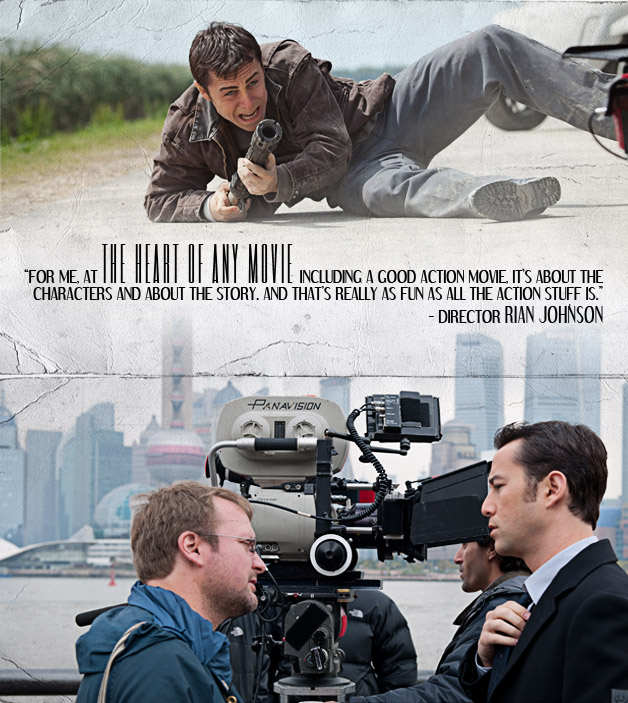
Considering Bruce Willis career in action films, did it all seem second nature to him on set.
Well the action parts did, and he definitely gave us some pointers. I remember [the scene] when Joe’s escaping from the diner, and he had to like drag Joe across the room, he was showing Joe exactly how to do it, and Joe’s face was just glowing, he was in heaven, being told by Bruce Willis how to do an action scene.
And what about getting him to go to those darker places you mentioned?
Bruce is great actor. It’s all about diving into stuff that you have never dove into before and experiencing it moment to moment, and really living it. And you know, Bruce just really tackled [it], and some of the vulnerable places that he went to with this character were just as thrilling to watch if not more so [than the action].
You seem to like working with the same actors, both Joseph and Noah Segan were in Brick and had cameos in The Brother’s Bloom, do you find having an existing relationship with the actors, makes the whole experience a little more intuitive?
You form a bond of trust with people that you worked with before, which is a really good thing, I guess the danger in that is leaning on their trust. Hopefully, the way you use it is to challenge each other; the more you trust each other, the more you challenge each other, the further you can push each other, and the further you can kind of trust the limits of making creative choices that you may not have otherwise done or might not otherwise have the confidence to make. It’s a lot more fun making movies with your friends, it’s just all about making sure that every body is still there to work incredibly hard, and to give their best work that they can, and your not just making a movie so you can all hangout.
Just going back to the plot again, what about the dilemma of killing a duplicate version of one’s self is so appealing to a writer? It seems to be a fairly popular theme in science-fiction.
Well…the idea of sitting across from yourself, an older version of yourself, and having the conversation of: ‘I am not going to turn into you,’ I think that is a really relatable human thing.
Yeah, I guess it brings it back to a human level, less sci-fi when you look at it from that perspective.
To me that’s all the sci-fi that I love, that’s what it does: it takes these ridiculous sci fi premises, and then applies them in a way that communicates some real human truth that couldn’t be more down to earth. So I think that was the basic appeal. Yes, it’s this fantastic situation where you are trying to kill your older self, but in a sort of psychological way, it’s what we all do as teenagers right?
Yeah, the never-going-to-be-you, sort of thing.
And because you’re a teenager, you’re very petulant usually, but anyways, so that’s [what] I think… beside the excitement of doing a sci-fi movie that was kind of fucked up.
Any ideas brewing for your next feature?
No…do you have any ideas? I’m soliciting ideas. No, I am writing a couple things right now…I didn’t really have something coming out of the gate. When I finished up Looper, I didn’t really have the next idea ready, so I have been starting from the ground up, just trying to work out something. Hopefully I can come up with something.
Did you get some inspiration for New Orleans perhaps?
Oh my god yes…it is was just an incredible place to be! Yeah, that’s a good idea, maybe we will do a movie about a a New Orleans trumpet player, Count Joe…Joe the Tom Waits style: drunk wandering the streets of New Orleans, I can see it.









